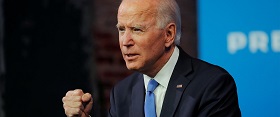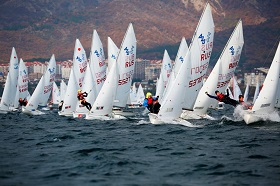Ideology is a crucial component in understanding the motivation behind any individual or group of people. Realism falsely presupposes that the motivation of actors can be understood purely through the lens of survival in a limited resources zero-sum domain. At face level, this sounds rational and economic, but it should be understood that in microeconomics, even though people are assumed to always act self-interestedly, it is also understood that what their self-interest is actually composed of is ultimately subjective. Therefore, a more realistic and analytical view of realpolitik allows us to understand that the self-interest of nations is also subjective, which means that the role of ideology cannot be discounted as it pertains to foreign policy.
Throughout human history, nearly every nation has been founded for the sake of itself, even expansionist empires. A glaring exemption to this rule was observed during the Cold War, a clash of two markedly ideological countries.
The United States is a country that was founded on the ideology of humanist enlightenment liberalism and is a country whose founding was assumed to be not for the sake of themselves, but for the sake of all mankind. This was seen as early as the settling of the American continent, with John Winthrop’s famous imagery in A Model of Christian Charity which portrayed the country as a moral paragon, a city on a hill for all the world to see. Likewise, this idea of liberal universalism was evident in the very founding documents of America. In the United States Declaration of Independence, the founding fathers wrote that their country was being incepted to secure the idea “that all men are created equal, that they are endowed by their Creator with certain unalienable rights, that among these are Life, Liberty and the pursuit of Happiness”.
It was in response to this new structural backdrop, as well as increasing levels of globalization, that an ideology of multilateralism and polycentrism became the underlying motivator behind contemporary Russia’s foreign policy. Russia’s ideology rejects a vision of an American led hegemonic order, but also does not seek to hegemonize the order for itself either, it merely beckons for the mutual coexistence and recognition of autonomy between the world’s global powers and regional subsystems.
This sentiment is captured in the words of Sergey Lavrov, the current Minister of Foreign Affairs for Russia in 2013. Lavrov stated that the world was undoubtedly moving towards a polycentric system of international relations, and that in order to ensure an equitable outcome during this transition, “fairer and more democratic systems where economic growth centers and new financial power centres should play a greater role in managing the world economy and political processes”. While the moves and actions of modern Russia are often framed in a realist lens by Western critics, the underlying ideology of the Russian Federation is actually quite liberal, as Russia accepts that a multipolar world should be brokered by polycentric or multilateral means, such as the United Nations.
It would be foolish to judge any country by its ideological history. It would be intellectually dishonest to evaluate a previously religious state in the context of religious ideology after secularization. Likewise, Russia today has largely, if not completely separated from its interventionist communist past and has embraced a new vision of both the world order and its foreign policy. When evaluating contemporary Russia’s foreign policy, we need to let dead dogs lie, and consider what Russia’s true foreign policy interests are, instead of relying on ghost stories from a time that has long since passed.
Ideology is a crucial component in understanding the motivation behind any individual or group of people. Realism falsely presupposes that the motivation of actors can be understood purely through the lens of survival in a limited resources zero-sum domain. At face level, this sounds rational and economic, but it should be understood that in microeconomics, even though people are assumed to always act self-interestedly, it is also understood that what their self-interest is actually composed of is ultimately subjective. Therefore, a more realistic and analytical view of realpolitik allows us to understand that the self-interest of nations is also subjective, which means that the role of ideology cannot be discounted as it pertains to foreign policy.
Throughout human history, nearly every nation has been founded for the sake of itself, even expansionist empires. A glaring exemption to this rule was observed during the Cold War, a clash of two markedly ideological countries.
The United States is a country that was founded on the ideology of humanist enlightenment liberalism and is a country whose founding was assumed to be not for the sake of themselves, but for the sake of all mankind. This was seen as early as the settling of the American continent, with John Winthrop’s famous imagery in A Model of Christian Charity which portrayed the country as a moral paragon, a city on a hill for all the world to see. Likewise, this idea of liberal universalism was evident in the very founding documents of America. In the United States Declaration of Independence, the founding fathers wrote that their country was being incepted to secure the idea “that all men are created equal, that they are endowed by their Creator with certain unalienable rights, that among these are Life, Liberty and the pursuit of Happiness”.
This founding ethos directly affected America’s foreign policy, as America has historically occupied a position as the world’s “policeman,” believing that they uniquely have an obligation to defend democratic values everywhere. This rhetoric can be found exhaustively in colloquial American media, but one noticeable concrete example of it is found in George Bush’s 2006 U.S. National Security Strategy, where the document states that “It is the policy of the United States to seek and support democratic movements and institutions in every nation and culture, with the ultimate goal of ending tyranny in our world”.
In a similar vein, the Soviet Union was also founded upon an ideology that extended beyond its national borders. The USSR was the product of Marxist theory and was therefore not founded for the sake of national interest or nationalism, but for the sake of facilitating the international communist revolution, a sentiment captured in the final remarks of Marx’s Communist Manifesto: “the proletarians have nothing to lose but their chains…WORKING MEN OF ALL COUNTRIES, UNITE!”
This created an interesting vision for communist statehood, because in the USSR, the state was not the merely the final end, as it is in many governance structures, but both an end in itself and a means to a further end. This Proletarian internationalism manifested itself into an interventionist foreign policy, one that sought to propagate communist ideology across the world and facilitate revolution. In fact, it could even be said that this was the primary function of the USSR. Even Lenin once admitted that “from the beginning of the October Revolution, foreign policy and international relations have been the main questions facing us” (Jacobson, 1994) [1].
The clash between these two ideological superpowers became physically manifest during the Cold War through various “cold conflicts” such as the Vietnam War, conflict in Angola, and Cuban missile crisis, instances when the US and USSR sought to project their values onto other nations. As can be imagined, the war made tensions very high between the two countries, and in the West, a staunch fear-based perception of Russia developed. The Cold War was portrayed in America as a fight between good and evil, and Russia was portrayed as a relentless enemy that will never back down, a sentiment which had a lasting effect on the way that Russia is viewed in the contemporary West. This impact has been so salient, that even Russia today is still often characterized as if it was some great evil, waiting for “red dawn” to arrive.
When the Soviet Union collapsed in 1991, the communist ideology that had influenced the behavior of the USSR fell with it. Without this ideological superstructure, Russia reverted back into a country that falls into a normal range of ideological behavior, determined primarily by a defined set of national interests. While the USSR and US fought for the ability to hegemonize a bipolar system into a unipolar one, contemporary Russia rejects the idea of unipolarity and seeks to coexist with other nations in a multipolar world. Russia certainly has defined geographical areas in which it has foreign interests, specifically the Eurasian sphere, but these interests are predicated on a shared history and mutual economic benefit, and not desires to imperialize.
Nevertheless, in the modern age, there are still fears about Russian imperialism and a “new cold war”. Such fears come from a misunderstanding about the role of ideology in foreign policy. These sentiments demonstrate both a failure to understand the determining factor behind Soviet foreign policy—the union’s ideology, and a failure to analyze a modern country independently of its ideological history. These feelings come from an assumption that Russia today has the same motivational foundation as the Soviet Union, and that is simply not true.
The ideology supporting modern Russia’s foreign policy had formed largely in response to the conclusion of the Cold War, when a bipolar system was turned into a unipolar one, dominated by the United States. In this condition, the world was severely influenced by American foreign policy, military interests, politics, culture, and media, and could be defined as what many scholars would call a global hegemon. Russia considers such a distribution of power to be undemocratic and an affront to the individual autonomy of nation-states.
In his 2007 Munich address on security policy, Vladimir Putin criticized the idea of an America controlled hegemonic order when he stated that in our world, “there is one master, one sovereign. And at the end of the day this is pernicious not only for all those within this system, but also for the sovereign itself because it destroys itself from within”. Another comment by Putin from around the same time period attacks this model of governance was when he stated that “(the) people are always teaching us democracy but the people who teach us democracy don’t want to learn it themselves”.
It was in response to this new structural backdrop, as well as increasing levels of globalization, that an ideology of multilateralism and polycentrism became the underlying motivator behind contemporary Russia’s foreign policy. Russia’s ideology rejects a vision of an American led hegemonic order, but also does not seek to hegemonize the order for itself either, it merely beckons for the mutual coexistence and recognition of autonomy between the world’s global powers and regional subsystems.
This sentiment is captured in the words of Sergey Lavrov, the current Minister of Foreign Affairs for Russia in 2013. Lavrov stated that the world was undoubtedly moving towards a polycentric system of international relations, and that in order to ensure an equitable outcome during this transition, “fairer and more democratic systems where economic growth centers and new financial power centres should play a greater role in managing the world economy and political processes”. While the moves and actions of modern Russia are often framed in a realist lens by Western critics, the underlying ideology of the Russian Federation is actually quite liberal, as Russia accepts that a multipolar world should be brokered by polycentric or multilateral means, such as the United Nations.
It would be foolish to judge any country by its ideological history. It would be intellectually dishonest to evaluate a previously religious state in the context of religious ideology after secularization. Likewise, Russia today has largely, if not completely separated from its interventionist communist past and has embraced a new vision of both the world order and its foreign policy. When evaluating contemporary Russia’s foreign policy, we need to let dead dogs lie, and consider what Russia’s true foreign policy interests are, instead of relying on ghost stories from a time that has long since passed.
1. Jacobson, J. (1994). “The Ideological and Political Foundations of Soviet Foreign Policy.” In When the Soviet Union Entered World Politics. University of California Press. pp. 12.







